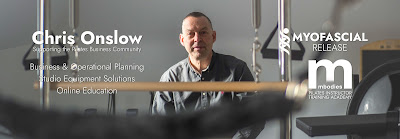The Importance of Specialised Pilates CPD Courses for Menopausal Health: Responding to Criticism with Facts
Introduction
The launch by Mbodies Training Academy of specialised
courses such as "Pilates for Midlife Health and the Menopause" has sparked
discussions in the fitness and Pilates communities. Some critics view it as
unnecessary specialisation in an already well-established field. This blog post aims to address criticisms that
such courses are merely pandering to "wokeness," by demonstrating the
tangible benefits these targeted programs offer to clients undergoing
menopausal transitions. In this article
we will explore how hormonal and psychological changes during perimenopause and
menopause can significantly influence exercise efficacy, and why tailored
Pilates programs are essential if an instructor is to maximise exercise and
mental health value to their clients.
Understanding Menopause and Exercise
Menopause marks a significant change in a woman's life,
accompanied by various hormonal adjustments that affect the body physically and
mentally. These changes include fluctuations in oestrogen and progesterone
levels, which can impact bone density, muscle mass, joint health, weight gain
or loss, and overall energy levels. Psychologically,
menopause can lead to mood swings, anxiety, and depression, influencing a
woman's motivation and ability to engage in regular exercise.
The Science Behind Tailored Exercise
The criticism often levelled at specialised fitness courses
for menopausal women is that they segregate rather than integrate. However, this perspective fails to appreciate
how menopause-specific issues can affect physical activity. For example, high-impact exercises that are
generally beneficial can exacerbate joint pain and influence bone health during
menopause at a neurological or physiological level and at the same time
influence hormone balances and interactions. A tailored Pilates program can address these
nuances by focusing on low-impact, strength-building exercises that enhance
core strength, flexibility, and overall stability without putting undue stress
on vulnerable joints.
Pilates and Hormonal Considerations
Pilates, particularly when adapted for menopausal clients,
can be an excellent exercise choice because it incorporates strength,
flexibility, and mental focus. The
controlled, flowing movements in Pilates can help manage and mitigate the
physical changes brought about by hormonal fluctuations, such as increased
abdominal fat and reduced muscle mass. Moreover,
the emphasis on breathing and mindfulness within Pilates can significantly
benefit psychological well-being, helping to alleviate symptoms of depression
and anxiety commonly experienced during this period.
Hormonal Balance and Stress Management
During stressful situations, the body’s adrenal glands
release hormones like adrenaline and cortisol. Adrenaline increases energy levels, while
cortisol helps in managing several body functions critical during stress. However,
prolonged exposure to cortisol can disrupt nearly all bodily processes, leading
to several health issues such as anxiety, depression, and heart disease.
For menopausal women, managing stress is paramount as their
bodies are already undergoing significant hormonal upheaval. Chronic stress can
exacerbate menopausal symptoms and disrupt hormonal balance further. Therefore,
a Pilates program tailored for menopausal women can help manage stress
effectively by incorporating exercises that stimulate the parasympathetic
nervous system, the body's rest and digestive systems, which helps in lowering
cortisol levels.
CPD Courses: Bridging Knowledge Gaps
Continuing Professional Development (CPD) courses in Pilates
for menopausal health are not merely a nod to contemporary social movements,
but a necessary evolution in fitness education. These courses equip instructors with the
knowledge and tools to design exercise programs that are not only safe, but
also highly effective for this demographic. Understanding the biomechanical and hormonal
shifts that occur during menopause allows fitness professionals to tailor their
coaching strategies accordingly, ensuring that they can meet the specific needs
of their clients.
Conclusion
The development of CPD courses like Mbodies Training Academy’s:
"Pilates for Midlife Health and the Menopause" is a response to a
real and pressing need. Far from pandering, these programs reflect a deepening
understanding of how different life stages affect physical health and exercise
requirements. For Pilates instructors,
acquiring this specialised knowledge is not just about expanding their skill
set - it's about providing the best possible support to their clients,
enhancing both physical and mental health outcomes during a pivotal phase of
life.
Through targeted online training, which can be taken in your
own time and at your own pace anywhere in the world, Pilates instructors can
become adept at supporting menopausal women, thereby playing a crucial role in
managing and mitigating the impacts of this significant life transition. This
approach does not dilute the value of exercise; rather, it enhances it,
ensuring all clients receive the thoughtful, informed, and most effective
guidance they deserve.
More reading: The business case for Pilates instructors specialising in perimenopause and menopause
Author: Chris Onslow - Pilates Consultant
Chris Onslow, has run Pilates focussed businesses since 1998. He and his team specialise in supporting Pilates entrepreneurs and business owners. With a rich history of owning and running successful Pilates studios in the UK, and supporting others in Europe and the Middle East, Chris has broad expertise in maximising profitability and optimising operational efficiency. His agency provides top-tier advice on selecting new, pre-owned, and hireable Pilates equipment from renowned brands such as Align-Pilates, Balanced Body or Stott-Pilates/Merrithew. As the founder of Mbodies Training Academy, Chris continues to revolutionise Pilates education, offering premier online and hybrid CPD and qualification courses for Pilates apparatus instruction and special population CPD. Discover more about how Chris can support your Pilates Business or home exercise choices at www.pilates-consultant.co.uk






Comments
Post a Comment